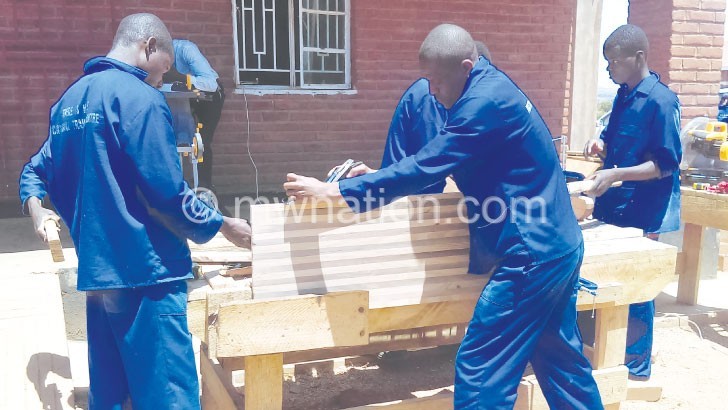Vocation training unites refugees and Malawians
For eight years, Congolese national, Ramazani Baruti, had been doing piecework and moulding bricks in communities around Dzaleka Refugee Camp in Dowa.This hardly generated enough income for the 27-year-old father of three who fled a protracted war in his mineral-rich country.
In 2016, he completed a carpentry course at There is Hope (TIH), which offers refugees and Malawians around Dzaleka Refugee Camp technical and vocational training.
“With the plain and saw I got after completing the course two years ago, I started up a business which has turned my life around,” he explains.

Baruti makes beds, doors, window frames, chairs and other furniture which he sells to customers in Dowa, Lilongwe and surrounding districts.
Evans Mpinganjira, 30, from Traditional Authority (T/A) Nkukula in Dowa, followed in Baruti’s footsteps by establishing his own business after completing a carpentry course at TIH. The skills development centre has been training the youth in bricklaying, carpentry and tailoring since 2015.
In January, the European Union (EU) bankrolled a two-year project to build the capacity of vulnerable young adults in Dowa through vocational training. Under this initiative, TIH now offers plumbing, carpentry and welding on top of the traditional courses. The institution used part of the EU funding to construct hostels for female trainees and workshops for all courses.
“We are tired of being labelled as poor people. We want people to have skills and exercise them because we cannot be importing everything. We need to make things on our own, so we are training people in different skills to create jobs and make them self-reliant for the country to develop,” says TIH founder Innocent Magambi.
The refugee from Burundi says the skills’ centre is a result of a burning urge to give back to Malawi and the refugee community. His parents left Burundi in 1972 for the Democratic Republic of Congo, where he was born in 1979. They fled Congo in 1996 during the Kabika War and spent a year and a half at Maheba Camp in Zambia. He spent five years in two other refugee camps in Tanzania before coming to Dzaleka in 2003. While in Malawi, he won a scholarship to study Bible and theology at the Assemblies of God School of Theology, now Malawi Assemblies of God University.
As a way of giving back to the community, the youthful locals and refugees at his training centre access skills virtually for free as they pay just K2 000 per course.
“The feeling that Malawi invested in me as a refugee inspired me to start the organisation. I was given a scholarship to do university studies. Just the feeling of being accepted, acknowledged, loved and cared for got me thinking: what could I do to give back to the community that loved me but also to the community that I know best—the refugees. This is why TIH is supporting the two communities,” he explains.
Some former trainees from the centre own shops for carpentry, tailoring and other enterprises, while others are working in the construction, plumbing, tailoring and other projects taking place at the training centre.
“Most of the buildings here have been constructed by our students. Over 40 percent of our contractor’s workforce comprises people who got their skills from the centre,” says Magambi.
Recently, EU Delegation team leader Virginie Lafleur-Tighe toured the projects in Dowa. She noted that the centre is on course to become a major talking point when it comes to provision of technical and vocational education training in Dowa. Presently, it is a model for harmony and peaceful co-existence between refugees and natives, demonstrating that both can benefit together.
She stated: “A skilled worker generates economic development. So this is extremely important because in Malawi there is potential for economic growth. And it’s obvious that there are so many markets that need to be opened and so much that can still be done.
“What is missing is the sufficient number of skilled workers that can make that happen at all levels and in all trades. With technical and vocational education these workers will go out and get contracts and they will open markets.”
Some Malawians coming from faraway villages live at Dzaleka Refugees Camp. When the recent cohort received their certificates, they cheered each other and exchanged flowers. Such is the relationship that exists between the two communities. n





